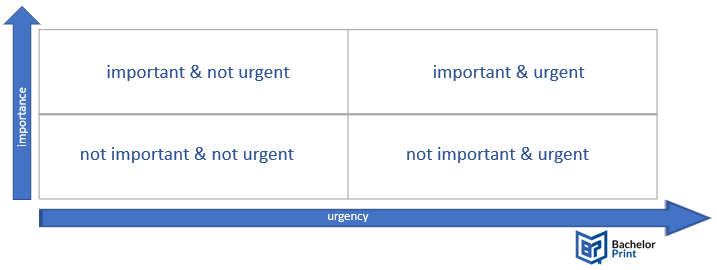
Tasks are every day’s responsibilities that each person requires to attend. Prioritization is crucial to ensure productivity in terms of urgency and importance. The following article discusses how you can use Eisenhower Matrix to achieve critical priority and effectively apply it in your day to day tasks.
FAQs
It is named after its inventor Dwight David Eisenhower who was an American and was a statesman and an army general. After becoming the 34th president of the United States, he faced many tasks that needed his attention. In the process of prioritizing them, he came up with the Eisenhower matrix.
The matrix consists of four quadrants that help prioritize tasks as urgent and important. The first quadrant is ‘Do,’ followed by ‘Decide’ then, ‘Delegate,’ and ‘Delete.’
There are two kinds of problems; the important and the urgent. Those that are important can never be urgent, and the urgent ones are not important. Using the principle helps eliminate the urgent needs that are never important hence creating room for urgent and important problems in eisenhower matrix.
An urgent need demands immediate action. It usually appears stressful, and the deadlines are very short. On the other hand, essential tasks significantly contribute to a person’s goals, mission, and values in the future.
As said earlier, essential things have long term effects on a person’s productivity. Therefore, if a need demands an immediate response and has no impact on your future success, it is an urgent unimportant task. They tend to take one’s time but adds no value.
Definition: Eisenhower Matrix
Dwight D. Eisenhower, the third president of the United States, invented Eisenhower Matrix. It is a useful tool used for decision making. It helps students prioritize and decide on tasks given to them according to their importance by dividing them into urgent and less urgent tasks.
The Eisenhower Matrix Quadrants
Important and Urgent
This category in the Eisenhower Matrix is also known as the ‘to do’ list. These tasks have timelines and therefore require more priority to complete. The jobs are essential since they relate to career objectives and long term life goals.
Examples of tasks in this group include:
- Any form of emergency that requires you to respond,
- Filing your tax returns
- Responding to urgent emails
- Attending high priority meetings
Doing early planning might help you avoid doing some essential things that may not be urgent. Ensure that you do your assignments early to avoid last-minute rush and remove it from your long list.
Important and Not Urgent
This section in Eisenhower Matrix includes tasks that are crucial but, at the same time, not urgent. They involve activities such as personal hygiene, social interactions, and self-improvement, among others. They need the motivation to complete them. It, therefore, requires a lot of will power to complete the tasks.
Below are examples of important and not urgent tasks:
- Household items shopping
- Financial planning
- House chores
- Keeping fit
- Practicing hobbies
Not Important and Urgent
Activities that fall under this Eisenhower Matrix group are urgent but not crucial because they have no future benefits. They involve exercises that you can assign to your peers and friends.
Examples of activities in this category include:
- Responding to emails, text messages, and calls that require less attention
- Doing favors for fellow students or family members
Please do not spend too much time on these activities since they involve helping out other people. It would be wise to delegate these tasks to other people who can offer better help than you.
Not Important and Not Urgent
This section in the Eisenhower Matrix is also known as the ‘do not do’ list. These activities are time-wasters. This is because despite not being urgent, they are not equally important. They do not achieve any meaningful goal in your life. They are distractions.
Examples of these activities include:
- Going through social media account
- Watching movies
- Playing computer games
- Surfing the internet without purpose
These activities need to be limited since they are unproductive. Do them during your leisure time or short breaks between other important and urgent tasks. Spending too much time on these may lead to addiction, thereby affecting your productivity.

Implementing the Eisenhower Matrix
You can use any of the below methods in implementing the Eisenhower Matrix:
1. Labels
Create the @important & @urgent labels. Assign them to your task appropriately in these four quadrants;
- @urgent & @important label applies to all tasks that need to be done immediately by yourself.
- The label of @important is assigned to tasks with a due date and requires your attention.
- Tasks relegated or delegated applies the label of @urgent.
- No addition of labels to tasks which you can delete or drop.
After labelling the important/urgent tasks, come up with the below 4 filters corresponding each quadrant.
- The urgent & important, the filter query will be @urgent & @important
- Important & not urgent bearing a filter query of @important & !@urgent
- Urgent & unimportant should have a filter query: @urgent & !@important
- Unimportant & not urgent having a filter query: !@important & !@urgent
- You can also create a single Eisenhower filter with the query: !@important & !@urgent, @urgent & !@important, @urgent & @important and @important & !@urgent. Then, combine them together.
Assigning them to your tasks require you to type @ on the field of your to-do things. It will then provide you with a list of labels you created recently to select.
2. Use of priority levels
There are Four priority levels created to match each of the four Eisenhower Matrix quadrants. The levels include:
- Priority level 1= urgent & important
- Priority level 2= not urgent & important
- Priority level 3= urgent & not important
- Priority level 4= not urgent & not important
3. Rebalancing your quadrants
Quadrant 2 is the most important one, and shifting more time to it is the aim of all the rebalancing. If you are stuck, determine your own desired outcomes, which tasks are urgent and essential, and organize them in quadrants.
If you spend your time on quadrant one, you can target to prevent problems and anticipate by investing time in planning. You can start by prioritizing your deadlines and current goals by creating a weekly or monthly plan.
If time was wasted on quadrant 3, minimize the time used on the tasks.
Do it by reducing the functions through a well-laid procedure. Time wasted on quadrant 4 creates a big stuck and causes a lot of time wastage. You can rebalance it by taking time to track to identify the most significant tasks that cause time wastage and eliminate or minimize them.
Advantages and Disadvantages

Advantages
Eisenhower Matrix helps you improve your time management skills. Applying this principle in your day to day life enables you to decide what to do and what not to do by setting priorities. Most people in top senior positions can apply the Eisenhower Matrix to carry out some tasks and delegate other activities to their employees, making them involved in the activities.
Eisenhower’s Matrix is applicable in both personal and professional life. It helps you manage your time by organizing and prioritizing your day to day activities.
It enhances self-awareness and improves self-analysis. Applying Eisenhower more frequently helps you see the variation of the importance of activities. It, therefore, enhances decision making. This method will improve the productivity of both your company and your personal life.

Disadvantages
It is time-consuming. Applying this principle is time-consuming and is nearly impossible daily. It takes much of your valuable time to figure out what to prioritize and what to leave out. It, therefore, leads to delays.
It is only applicable to fewer tasks. Having a long list of activities becomes challenging to apply the Eisenhower Matrix principle. Having a long list of activities makes it hard to prioritize tasks and therefore ends up doing or delegating tasks inappropriately.
It does not consider other factors such as complexity, resources, and the effort needed to perform the task. Some tasks may be urgent and essential but require other factors such as finances to be complete. It, therefore, disqualifies and removes them until resources are enough.
In a Nutshell
Eisenhower Matrix is a priceless skill and helps one improve productivity by;
- Learning how to prioritize tasks effectively.
- Determine which problems are urgent and essential hence allocating the required time where it’s needed most.
- To help you manage your work effectively, have in mind that urgency concerns time while importance depends on the choice
- Apply Eisenhower Matrix in the morning before starting any activity
- Perform and complete each task individually
- Delegate non-important tasks but urgent tasks to junior staff
